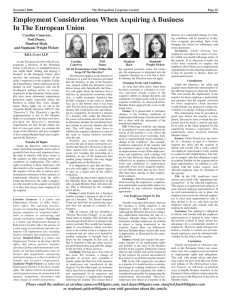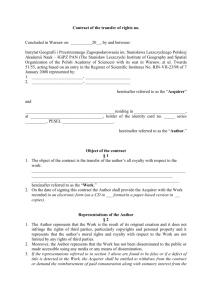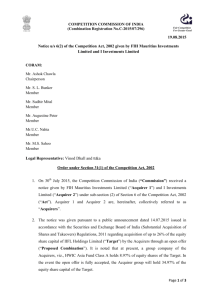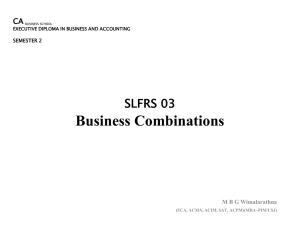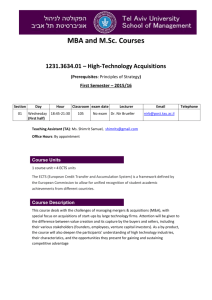Document 13386817
advertisement
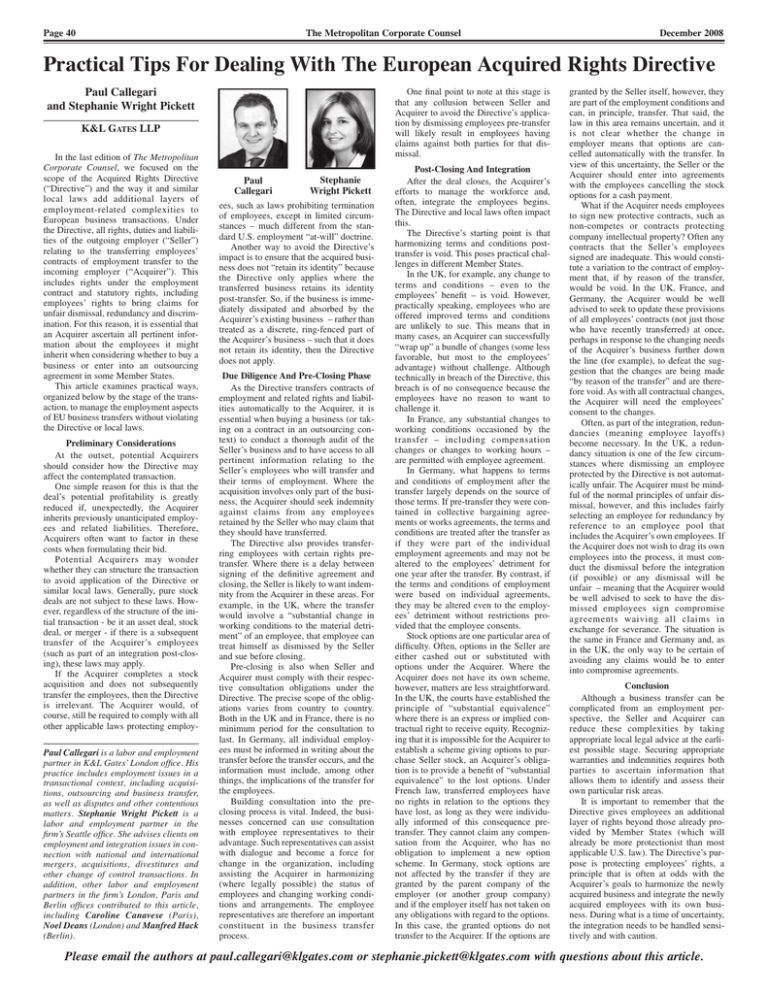
Page 40 The Metropolitan Corporate Counsel December 2008 Practical Tips For Dealing With The European Acquired Rights Directive Paul Callegari and Stephanie Wright Pickett One final point to note at this stage is that any collusion between Seller and Acquirer to avoid the Directive’s application by dismissing employees pre-transfer will likely result in employees having claims against both parties for that dismissal. K&L GATES LLP In the last edition of The Metropolitan Corporate Counsel, we focused on the scope of the Acquired Rights Directive (“Directive”) and the way it and similar local laws add additional layers of employment-related complexities to European business transactions. Under the Directive, all rights, duties and liabilities of the outgoing employer (“Seller”) relating to the transferring employees’ contracts of employment transfer to the incoming employer (“Acquirer”). This includes rights under the employment contract and statutory rights, including employees’ rights to bring claims for unfair dismissal, redundancy and discrimination. For this reason, it is essential that an Acquirer ascertain all pertinent information about the employees it might inherit when considering whether to buy a business or enter into an outsourcing agreement in some Member States. This article examines practical ways, organized below by the stage of the transaction, to manage the employment aspects of EU business transfers without violating the Directive or local laws. Preliminary Considerations At the outset, potential Acquirers should consider how the Directive may affect the contemplated transaction. One simple reason for this is that the deal’s potential profitability is greatly reduced if, unexpectedly, the Acquirer inherits previously unanticipated employees and related liabilities. Therefore, Acquirers often want to factor in these costs when formulating their bid. Potential Acquirers may wonder whether they can structure the transaction to avoid application of the Directive or similar local laws. Generally, pure stock deals are not subject to these laws. However, regardless of the structure of the initial transaction - be it an asset deal, stock deal, or merger - if there is a subsequent transfer of the Acquirer’s employees (such as part of an integration post-closing), these laws may apply. If the Acquirer completes a stock acquisition and does not subsequently transfer the employees, then the Directive is irrelevant. The Acquirer would, of course, still be required to comply with all other applicable laws protecting employPaul Callegari is a labor and employment partner in K&L Gates’ London office. His practice includes employment issues in a transactional context, including acquisitions, outsourcing and business transfer, as well as disputes and other contentious matters. Stephanie Wright Pickett is a labor and employment partner in the firm’s Seattle office. She advises clients on employment and integration issues in connection with national and international mergers, acquisitions, divestitures and other change of control transactions. In addition, other labor and employment partners in the firm’s London, Paris and Berlin offices contributed to this article, including Caroline Canavese (Paris), Noel Deans (London) and Manfred Hack (Berlin). Stephanie Paul Wright Pickett Callegari ees, such as laws prohibiting termination of employees, except in limited circumstances – much different from the standard U.S. employment “at-will” doctrine. Another way to avoid the Directive’s impact is to ensure that the acquired business does not “retain its identity” because the Directive only applies where the transferred business retains its identity post-transfer. So, if the business is immediately dissipated and absorbed by the Acquirer’s existing business – rather than treated as a discrete, ring-fenced part of the Acquirer’s business – such that it does not retain its identity, then the Directive does not apply. Due Diligence And Pre-Closing Phase As the Directive transfers contracts of employment and related rights and liabilities automatically to the Acquirer, it is essential when buying a business (or taking on a contract in an outsourcing context) to conduct a thorough audit of the Seller’s business and to have access to all pertinent information relating to the Seller’s employees who will transfer and their terms of employment. Where the acquisition involves only part of the business, the Acquirer should seek indemnity against claims from any employees retained by the Seller who may claim that they should have transferred. The Directive also provides transferring employees with certain rights pretransfer. Where there is a delay between signing of the definitive agreement and closing, the Seller is likely to want indemnity from the Acquirer in these areas. For example, in the UK, where the transfer would involve a “substantial change in working conditions to the material detriment” of an employee, that employee can treat himself as dismissed by the Seller and sue before closing. Pre-closing is also when Seller and Acquirer must comply with their respective consultation obligations under the Directive. The precise scope of the obligations varies from country to country. Both in the UK and in France, there is no minimum period for the consultation to last. In Germany, all individual employees must be informed in writing about the transfer before the transfer occurs, and the information must include, among other things, the implications of the transfer for the employees. Building consultation into the preclosing process is vital. Indeed, the businesses concerned can use consultation with employee representatives to their advantage. Such representatives can assist with dialogue and become a force for change in the organization, including assisting the Acquirer in harmonizing (where legally possible) the status of employees and changing working conditions and arrangements. The employee representatives are therefore an important constituent in the business transfer process. Post-Closing And Integration After the deal closes, the Acquirer’s efforts to manage the workforce and, often, integrate the employees begins. The Directive and local laws often impact this. The Directive’s starting point is that harmonizing terms and conditions posttransfer is void. This poses practical challenges in different Member States. In the UK, for example, any change to terms and conditions – even to the employees’ benefit – is void. However, practically speaking, employees who are offered improved terms and conditions are unlikely to sue. This means that in many cases, an Acquirer can successfully “wrap up” a bundle of changes (some less favorable, but most to the employees’ advantage) without challenge. Although technically in breach of the Directive, this breach is of no consequence because the employees have no reason to want to challenge it. In France, any substantial changes to working conditions occasioned by the transfer – including compensation changes or changes to working hours – are permitted with employee agreement. In Germany, what happens to terms and conditions of employment after the transfer largely depends on the source of those terms. If pre-transfer they were contained in collective bargaining agreements or works agreements, the terms and conditions are treated after the transfer as if they were part of the individual employment agreements and may not be altered to the employees’ detriment for one year after the transfer. By contrast, if the terms and conditions of employment were based on individual agreements, they may be altered even to the employees’ detriment without restrictions provided that the employee consents. Stock options are one particular area of difficulty. Often, options in the Seller are either cashed out or substituted with options under the Acquirer. Where the Acquirer does not have its own scheme, however, matters are less straightforward. In the UK, the courts have established the principle of “substantial equivalence” where there is an express or implied contractual right to receive equity. Recognizing that it is impossible for the Acquirer to establish a scheme giving options to purchase Seller stock, an Acquirer’s obligation is to provide a benefit of “substantial equivalence” to the lost options. Under French law, transferred employees have no rights in relation to the options they have lost, as long as they were individually informed of this consequence pretransfer. They cannot claim any compensation from the Acquirer, who has no obligation to implement a new option scheme. In Germany, stock options are not affected by the transfer if they are granted by the parent company of the employer (or another group company) and if the employer itself has not taken on any obligations with regard to the options. In this case, the granted options do not transfer to the Acquirer. If the options are granted by the Seller itself, however, they are part of the employment conditions and can, in principle, transfer. That said, the law in this area remains uncertain, and it is not clear whether the change in employer means that options are cancelled automatically with the transfer. In view of this uncertainty, the Seller or the Acquirer should enter into agreements with the employees cancelling the stock options for a cash payment. What if the Acquirer needs employees to sign new protective contracts, such as non-competes or contracts protecting company intellectual property? Often any contracts that the Seller’s employees signed are inadequate. This would constitute a variation to the contract of employment that, if by reason of the transfer, would be void. In the UK, France, and Germany, the Acquirer would be well advised to seek to update these provisions of all employees’ contracts (not just those who have recently transferred) at once, perhaps in response to the changing needs of the Acquirer’s business further down the line (for example), to defeat the suggestion that the changes are being made “by reason of the transfer” and are therefore void. As with all contractual changes, the Acquirer will need the employees’ consent to the changes. Often, as part of the integration, redundancies (meaning employee layoffs) become necessary. In the UK, a redundancy situation is one of the few circumstances where dismissing an employee protected by the Directive is not automatically unfair. The Acquirer must be mindful of the normal principles of unfair dismissal, however, and this includes fairly selecting an employee for redundancy by reference to an employee pool that includes the Acquirer’s own employees. If the Acquirer does not wish to drag its own employees into the process, it must conduct the dismissal before the integration (if possible) or any dismissal will be unfair – meaning that the Acquirer would be well advised to seek to have the dismissed employees sign compromise agreements waiving all claims in exchange for severance. The situation is the same in France and Germany and, as in the UK, the only way to be certain of avoiding any claims would be to enter into compromise agreements. Conclusion Although a business transfer can be complicated from an employment perspective, the Seller and Acquirer can reduce these complexities by taking appropriate local legal advice at the earliest possible stage. Securing appropriate warranties and indemnities requires both parties to ascertain information that allows them to identify and assess their own particular risk areas. It is important to remember that the Directive gives employees an additional layer of rights beyond those already provided by Member States (which will already be more protectionist than most applicable U.S. law). The Directive’s purpose is protecting employees’ rights, a principle that is often at odds with the Acquirer’s goals to harmonize the newly acquired business and integrate the newly acquired employees with its own business. During what is a time of uncertainty, the integration needs to be handled sensitively and with caution. Please email the authors at paul.callegari@klgates.com or stephanie.pickett@klgates.com with questions about this article.
